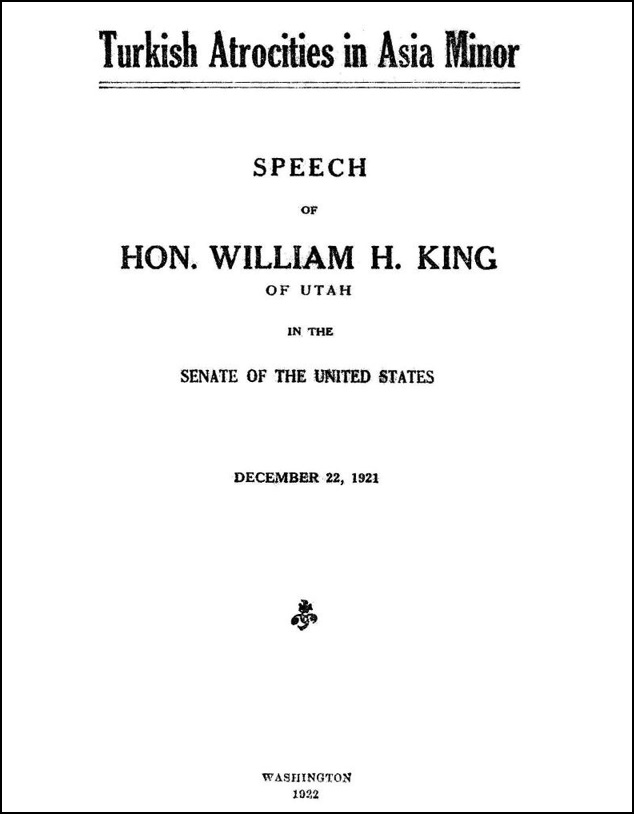TURKISH ATROCITIES IN ASIA MINOR
SPEECH OF WILLIAM H. KING OF UTAH IN THE SENATE OF THE UNITED STATES.
December 22, 1921.
Washington 1922.
29 pages.
William Henry King (1863–1949) was an American lawyer and politician from Salt Lake City, Utah. King represented Utah in the United States Senate from 1917 until 1941. In 1921, he delivered a speech in the U.S Senate highlighting the atrocities committed by Kemalist forces against native Greeks in Turkey. The Senator called for the appointment of an international committee to examine the atrocities and also suggested that the nations of the world unite against the barbarities. Neither eventuated.
Excerpts from his speech:
When the Young Turks obtained control of the Government in 1908, there was a change in the policy of dealing with the Christian subjects of the Sultan. They began boycotting the Greeks and Armenians and excited Mussulman mobs to attack and kill the people and destroy their homes. Whatever privileges had been accorded under the pressure of Christian nations were revoked. Thousands of Greeks were forced into "labor battalions," so called, where they speedily lost their lives. Gen. von Sanders Pasha, a German officer, aided in the execution of a plan by which the collective annihilation of the inhabitants could be effectuated. This plan was known as "deportation for strategic reasons." It was applied during the Balkan Wars, but when the World War began, it was extensively employed in all parts of Asia Minor where there were Greek populations. Under this plan the Christian population were driven from their homes into the waste and desert lands of Asia Minor, where they were left to perish for want of food and from inclemencies of the weather, or to fall victims to the murderous assaults of irregular troops and bandits and savage Kurds who infested the mountains and the plains. Under this plan more than 1,500,000 Christian Greeks and Armenians were destroyed. Their bleached bones lie in the mountain passes and on the deserts and plains of Anatolia. Their blood which drenched the soil cries aloud for vengeance.
In addition to the hundreds of thousands thus destroyed, tens of thousands of males were forced into the army or into the "labor battalions," and it is known that most of then came to untimely ends.
When Turkey signed the Armistice, the persecution which had continued up until that time ceased. The military and political authorities undoubtedly believed that if they continued this exterminating policy the dictated terms of the peace conference would be more severe. They hoped by an abandonment of their cruel policy to find some little favour in the eyes of the conquering nations. But after the treaty of Sevres was signed, and it appeared that some of the European powers were indifferent to the execution of its terms, and when Mustapha Kemal became powerful enough to attack the treaty, to violate its terms, and to wage war upon Greece, there was a revival of the cruelties and persecution not only of the Pontian Greeks but of all the Christian peoples within the Turkish territory.
[...]
Mr. President, the evidence is overwhelming, and to my mind conclusive, that the statements contained in the resolutions do not overdraw the picture. Indeed, the situation is far more tragic than that depicted in the resolutions. Unless some steps shall be taken by forces outside of Turkey to restrain the bloody hands of Mustapha Kemal, there would seem to be no hope of salvation for these unfortunate people, whose only offense is that they are Christians and have sought to give Turkey a civilization and a culture that would lift the Ottoman Turks to a higher plane, where they might fit to association with the civilized and progressive nations of the world.




